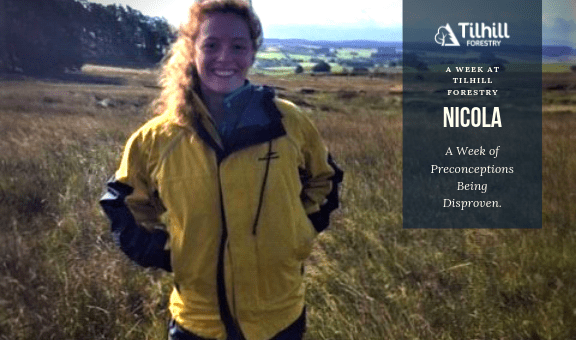My Week at Tilhill Forestry– A Week of Preconceptions Being Disproven.
By Nicola Fleck.
Nicola is from Sedbergh in Cumbria and has just completed her joint honours degree in Geology and Environmental Science at Lancaster University. Nicola is soon to start her MSc in Environmental Law at Lancaster. In looking to gain some hands on knowledge in a working environment, she approached Tilhill Forestry and spent a week learning about the forest industry. This is Nicola’s recount of that week:
People can hold many preconceptions about the forestry industry and the impact it has. Before spending a week with Tilhill Forestry in the Dunblane and Stirling offices, I did too, and they were mainly negative. Over the course of the week I gradually found that my preconceptions were being disproved and with good reason too.
The main preconception I had was that forestry was a damaging industry and incredibly harmful to the environment: A felled forest is an eye sore, the land itself is damaged by the uprooting of the trees and huge amounts of pollution occur through the use of heavy machinery. However, Tilhill Forestry showed me that this is not the case and they do everything to minimise the overall impact of their operations. From talking to members of the Company I could tell that this was one of their highest priorities.
A huge amount of work goes on behind the scenes for at least a year, or more in many cases, before a grant can be applied for and a single tree felled; what you see happening in the landscape is the last 5% of the process. Soil, vegetation, bird and protected species surveys are completed, and a landscape architect is consulted – these are things that I never even knew were considered! Management plans are created in such a way to make sure that the forest fits within the surrounding landscape and public opinions are gained to minimise the impact of the forest.
Forestry isn’t just about cutting down trees. A lot of people do not see it this way. Woodland creation, regeneration after felling and the buffering of existing protected areas or habitats is just as important. These can bring many benefits such as improved public access and recreation opportunities but also increased carbon sequestration, habitats and biodiversity. People only tend to see the negative impacts of the forestry industry, but after a week at Tilhill Forestry I have started to see that there may be more positives than negatives.
Many people think that the industry is solely run to gain as much financial benefit as possible. Tilhill Forestry showed me that quality can be preserved side by side with financial gain. An example of this is that UKWAS certification is suggested to every client. Whilst this may gain an extra £2 per tonne of wood for the client, it also assures that the forest is being sustainably managed, and the long-term management of the forest is being considered.
Whilst having my preconceptions disproved over the week, I gained insight into the different stages of the process from designing and surveying a potential site, harvesting the trees and getting the logs to the roadside, all the way to the end of the line with a visit to UPM Caledonian to look at their Paper Mill and CHP boiler. This really gave me an appreciation of the many different aspects of the forestry industry and Tilhill Forestry itself.
I am extremely grateful to all the members of Tilhill who gave up their time to look after and show me all the different parts of the company and potential areas within the industry that I may one day be a part of. But a personal thanks must go to Nicola Abbatt, Quality & Environment Manager, Andrew Vaughan, District Manager for Central Scotland John Gallacher, Forest Ecologist and Duncan MacKinnon, Wood Energy Development Manager
Nicola Fleck



